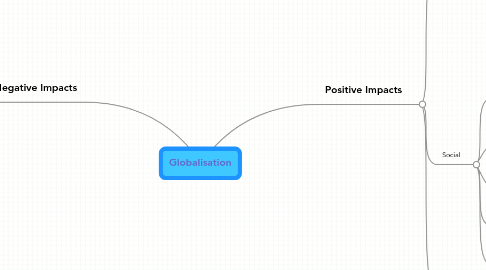
1. Negative Impacts
1.1. Economic
1.1.1. may exacerbate the problems of nagging poverty and uneven development, and create grave infra-structural mismatches
1.1.2. Increased flow of skilled and non-skilled jobs from developed to developing nations as corporations seek out the cheapest labor
1.1.3. Increased likelihood of economic disruptions in one nation effecting all nations
1.2. Social
1.2.1. Corporate influence of nation-states far exceeds that of civil society organizations and average individuals Threat that control of world media by a handful of corporations will limit cultural expression
1.2.2. Greater chance of reactions for globalization being violent in an attempt to preserve cultural heritage
1.2.3. Spread of a materialistic lifestyle and attitude that sees consumption as the path to prosperity
1.2.4. International bodies like the World Trade Organization infringe on national and individual sovereignty
1.2.5. Increase in the chances of civil war within developing countries and open war between developing countries as they vie for resources
1.3. Environmental
1.3.1. Decreases in environmental integrity as polluting corporations take advantage of weak regulatory rules in developing countries
1.3.2. Greater risk of diseases being transported unintentionally between nations, due to air pollution, either by deforestation or the fumes exhausted by the airplanes and ships transporting the goods.
2. Positive Impacts
2.1. Economic
2.1.1. Increased free trade between nations
2.1.2. Increased liquidity of capital allowing investors in developed nations to invest in developing nations
2.1.3. Corporations have greater flexibility to operate across borders
2.1.4. a huge increase in salaries of senior managers, accountants, lawyers and public-relations personnel working for MNCs or their local competitors. For the IT-literate, job opportunities have been plentiful, and there are also opportunities to live and earn abroad. For the English-speaking upper middle-class, this has come as a boon. new business opportunities.
2.2. Social
2.2.1. Global mass media ties the world together.Increased flow of communications allows vital information to be shared between individuals and corporations around the world .
2.2.1.1. For instance, the satellite TV channels, cellular phones, broadband, Internet, and so forth. All these have successfully transformed the world into a global village. The globalization of information is also proved from the usage of the most popular language, English, in the Internet. Moreover, there is the diminished use of paper with the spread of the new globalized information technology.
2.2.2. Reduction of cultural barriers increases the global village effect
2.2.3. Greater ease and speed of transportation for goods and people
2.2.4. Spread of democratic ideals to developed nations Greater interdependence of nation-states
2.2.5. Reduction of likelihood of war between developed nations
2.3. Environmental
2.3.1. Increases in environmental protection in developed nations
